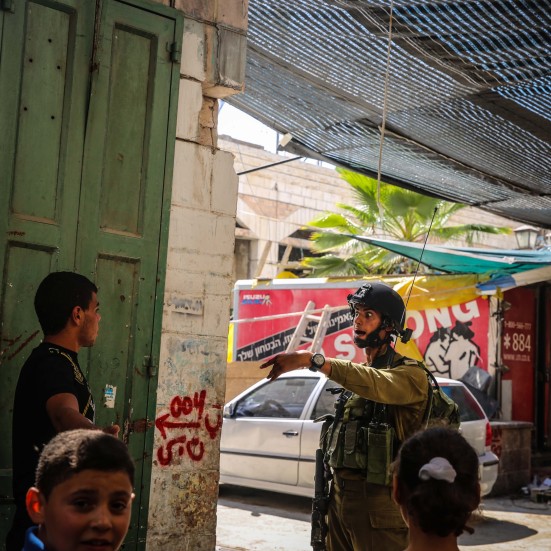Behind the Barricade

A new brigade, the Givati, have recently come to the Old City of Hebron to carry out Israel’s military occupation of Palestine. Last Wednesday, the Givati’s military presence was asserted when they arrested three Palestinian boys, ages thirteen to fourteen. As a matter of reference, Israeli soldiers are able to imprison Palestinian boys as adults once they reach the age of twelve years old, whereas Israelis cannot be imprisoned as adults until they are eighteen years old. Shortly after the aforementioned arrests, the Israeli soldiers established a human barricade, spanning more than three hundred yards, preventing Palestinians from walking and driving through the main streets of the Old City. Palestinian storekeepers were forced to close shops and soldiers conducted multiple ID checks. This detainment lasted for a couple of hours until soldiers went back to their military base, satisfied with the work they accomplished.
The next day, three more Palestinian boys and a man were arrested, and the Givati created another human barricade close to their military base in Bab al Baladeya. Over the span of thirty minutes, the soldiers ordered Palestinians and internationals to go behind the barricade. Hardly any person was allowed to get through, including a municipality worker who was collecting trash. Much like the previous day, Palestinian shops in the middle of these barricades were forced to close. One soldier was impatient with an elderly Palestinian man for slowly closing his store, yelling at the shopkeeper to hurry up as he bended over to pick up the pieces of what was left of his store. Before he closed his family’s shop, a Palestinian boy, noticing that I was documenting the oppression with a camera, handed me and my fellow CPTer an olive, and then another. “Shukran,” we said. “Afwan,” he replied.
As the soldiers maintained their barricade, they demanded Palestinians, including those who were elderly and differently abled, to be silent by placing a finger over their lips. Soldiers yelled and pushed back Palestinians from any space they could have. Most notably, the commander, with eyes glaring open, came back to the barricade to yell at the Palestinians. No pleading or resistance was allowed, not even the exchanging of goods.
While one store in the middle of the barricade was closing, Palestinians behind the barricade yelled over to the shopkeeper to request beverages. The shopkeeper came and gave them their requested drinks as the Palestinians behind the barricade gave him shekels. To the ire of the soldiers, Palestinians laughed as these exchanges occurred until the commander came over to prevent the shopkeeper from selling goods and forced him to step behind the barricade. The soldiers had accomplished their job: restrict and prevent Palestinian movement, no matter how small, no matter how unthreatening.
As an hour went by, I looked over to the other barricade that soldiers enforced, where dozens of Palestinians were prevented from moving. Suddenly, the gathering behind this barricade dispersed and fled as a sound grenade went off. An Israeli soldier threw a sound grenade directly at the crowd even though the soldier was within ten feet of the Palestinians. Smoke from the explosion engulfed the area. On our side of the barricade, Palestinian children and adults ran away, fearing that the soldiers near us would do something similar. The soldiers near us contemplated following suit, as one soldier immediately pulled out a sound grenade himself. Thankfully, he never threw anything. Within ten minutes of these acts of violence, the commander ordered his troops to go back to their military base. We all felt a collected sense of relief. The soldiers went back to their home, and we were allowed to go back to ours.










